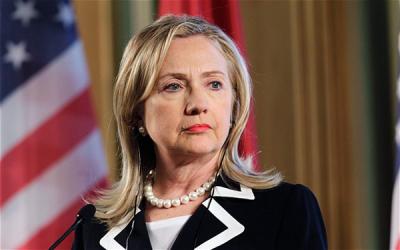No doubt alarmed by the excitement around Mrs. ClintonŌĆÖs candidacy in the next US Presidential election, an American TV host put the following question to a political observer:
ŌĆ£Ms. Huffington,ŌĆØ he asked, ŌĆ£can Hillary Clinton be stopped?ŌĆØ
Ms. Huffington answered:
ŌĆ£Why does she have to be stopped? How come whenever a woman wants power, we treat her like Godzilla? She wants to be President, not destroy Tokyo.ŌĆØ
Anyone who has caught one of the ŌĆ£GodzillaŌĆØ installments will be incapable here of suppressing the image of a monster-sized Hillary, all scales and blonde bob, crashing huge reptilian limbs over a trembling Japanese city. (By contrast, Mrs. ClintonŌĆÖs announcement video features her placidly sitting with an elderly couple in a retirement home, her face the very picture of serenity, earning her the nickname ŌĆ£grandmother-in-chiefŌĆØ.)
Political battles everywhere are fought through images. But it is women who seem particularly branded by them. ŌĆ£GodzillaŌĆØ is relatively new, but ŌĆ£Iron LadyŌĆØ has been overused, from Margaret Thatcher to Indira Gandhi and Benazir Bhutto; ŌĆ£MotherŌĆØ is familiar to both Mrs. Gandhi and Angela Merkel (i), and in 2008, US Vice-Presidential hopeful Sarah Palin shockingly won favor solely by selling her image as a ŌĆ£hockey momŌĆØ (i.e., ŌĆ£a pitbull wearing lipstickŌĆØ).
This isnŌĆÖt to say that men in politics donŌĆÖt have their own image wars to fight. Barack ObamaŌĆÖs 2008 campaigners worked tirelessly to counter attacks ranging from a middle name that conjured fears of Al-Qaeda, to an African-American heritage that needed to strike the right balance for appealing to African-American voters without alienating the majority.
But while ObamaŌĆÖs team battled religious and racial stereotypes, their task remained gender-neutral. Mrs. Clinton, on the other hand, and other political women face a barrage of gender stereotypes just as violent. Like a non-human anime monster. Or a half-safe, half-dangerous ŌĆ£MotherŌĆØ. Or a ruthless ŌĆ£Iron LadyŌĆØ, with either an effaced husband or a dead one.
Back home, over the last Mauritian general elections, promises for 33% of women in the National Assembly were sprinkled like chocolate powder all over political campaigns. Yet, for all our good intentions and excellent rankings on African economic indices, Mauritius continues to freefall in female representation in government. Today women make up only 12% of the Mauritian National Assembly. In 2013 that percentage in Rwanda was 56% (the highest in the world), 50% in the African Union Parliament, and 40% in Senegal, Seychelles and South Africa (ii).
It is a fact that changing mindsets about women in politics must have the numbers to show. But unless we want artificial gender representation ŌĆō which does not reflect true advancement in gender fairness ŌĆō this is a struggle that must go beyond numbers.
We need to rethink the images that oppress women ŌĆō especially those images that we take for granted.
There is no use for 33% of women in the Mauritian National Assembly if those women will be told by their male peers to ŌĆ£find a husbandŌĆØ, or to go ŌĆ£put your kids to bed nowŌĆØ. There can be no fairness when the media find it cute to cover stories about the makeup and hair habits of female politicians. ŌĆ£RepresentationŌĆØ will only be a travesty if political parties continue to have ŌĆ£ailes f├®mininesŌĆØ, as if the party itself were a male business with women only in the ŌĆ£wingsŌĆØ.
There will, finally, be no point to quotas if the only images of strong political women circulated across the media and public consciousness are Authoritarian Ball-Buster, Matronly Mother-Figure, or Husbandless Hysteric.
The battle of images is faced by every politician, man and woman alike. But the gendering of those images overwhelmingly affects women ŌĆō and, often, these are images from which they cannot break free.
Over her extensive political career, Mrs. Clinton has freed herself of several stereotypes, from wounded wife to vindictive shrew. Godzilla will clearly not hold her for long. Other women, however, might not be so lucky. ┬Ā
ŌĆ£Godzilla; or the Battle of Images for Women in PoliticsŌĆØ
- Publicit├® -
EN CONTINU Ōå╗


